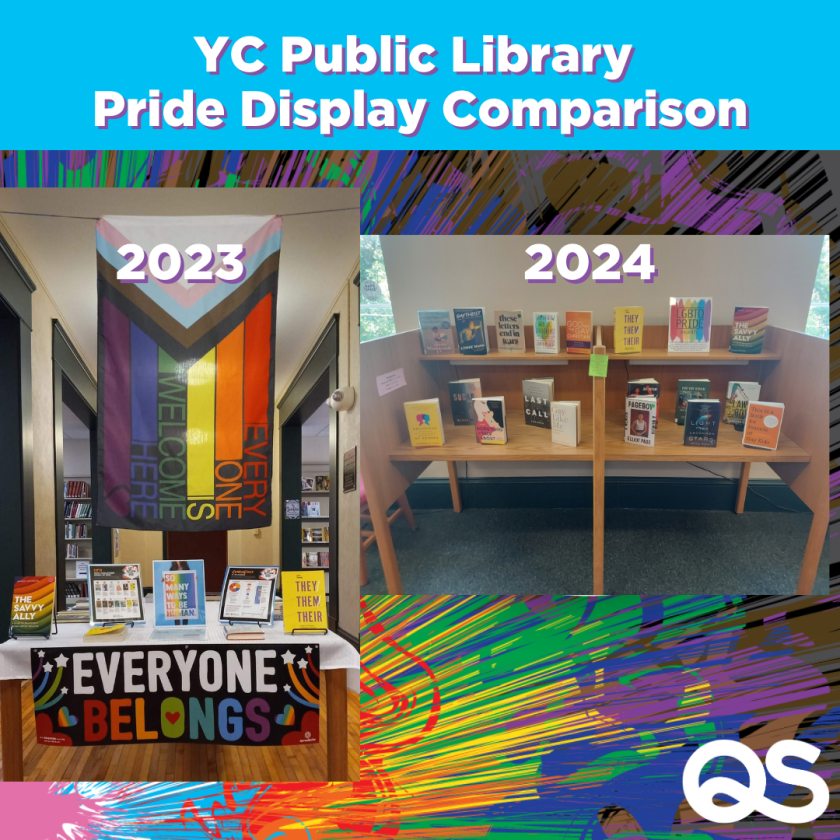On June 26th, 2024, giving only 48 hours’ notice about a public meeting, the clerk of the Yancey County Board of Commissioners sent an agenda that contained just one item: discussing the AMY (Avery, Mitchell, and Yancey counties) Regional Library contract.
This agenda item spread concern among Yancey County residents who had been worried about the health of their library since last summer, when the county commissioners almost withdrew from the regional library system after a complaint about an LGBTQ book display sparked debates.
The past year has been fraught with debate about book selections and displays, which made the notification about the public meeting in June 2024 a source of panic for some locals.
A Community Mourns
On June 28th of this year, two days after the county clerk sent out the meeting agenda, the Yancey County Board of Commissioners hosted their public meeting about the regional library contract in downtown Burnsville, the county seat. Yancey is a rural county of about 18,000 residents in the Blue Ridge Mountains about 35 miles north of the city of Asheville.
A crowd packed into the courtroom on the humid top floor of the Yancey County Courthouse. I arrived with my recorder, ready to capture whatever debate was about to ensue. But the only audio I snagged was the sound of a disgruntled crowd as the commissioners packed up their belongings and filed out the door.
The commissioners passed a motion to begin proceedings to withdraw from the AMY Regional Library contract. And they immediately adjourned after the motion passed with no time for public comment.
A few attendees shouted at the commissioners, then sat back down on wooden seats, their heads down. A few others silently wiped tears from their cheeks.
“There are a lot of people who will miss the services that are available now, especially the Bookmobile,” said Yancey County resident and county commissioner candidate Jim Parlier, whose campaign is built partially on his support for the library.
Divisions Hurt a Small Town
Since last summer, when the commissioners first entertained the idea of withdrawing, they appointed a slew of new members to the Yancey County Public Library Board, including several county commissioners themselves, such as Jeff Whitson, the county’s board chair.
Some of the newly appointed board members disparaged the library and its staff, according to an August, 2024 public statement made by AMY Regional Director Amber Westall Briggs.
“I’ve never seen such nastiness and ill-will from board members,” Briggs wrote in her statement. “Disparaging staff and the library as board members are generally grounds for dismissal from a board, but the commissioners who appointed them were silent.”
Briggs said a few residents have called library staff groomers and pedophiles because the library contains an LGBTQ book selection.
Although the commissioners have not stated that their desire to withdraw from the regional system is due to book selection and display censorship—since doing so would be an admission of violating the First Amendment—locals suspect this is the true motive.
The new chair of the Yancey County Public Library, who was appointed by the commissioners, said the reason she joined was because she didn’t agree with the LGBTQ book display that the library staff organizes once every June to celebrate Pride Month. Sheila Poehler, the Yancey resident who made the original complaint about the displays, was also appointed by the commissioners to the library board.
Briggs told the Daily Yonder that the AMY Regional Library system recently secured legal counsel.
The newly appointed library board also passed a policy that there shall be “no flags, no decorations, only minimal signage and book displays to be in appropriate areas.”
According to Briggs, the library complied with the commissioners’ requests by placing the LGBTQ book display in the adult fiction section, a less noticeable area of the library.

Briggs feels left in the dark as to why the commissioners changed their minds and have decided not to compromise with her to save the library.
“The people deserve an answer,” Briggs wrote in her public statement.” What I imagine is that [they] can’t give it, because it is discriminatory in nature.”
Yancey County board chair Jeff Whitson did not respond to the Daily Yonder’s multiple requests for comment.
What Is a Regional Library?
The AMY Regional Library system is a tri-county organization with four public library locations in rural Western North Carolina. As a part of a regional library system, the Yancey County Public Library has access to extra grants and state aid that libraries run by local governments do not.
Under the regional system model, each participating county receives block grants from the state. In the AMY Regional System, for instance, Avery, Mitchell, and Yancey counties each received about $80,000 in annual funds from state sponsored block grants during the 2023-2024 fiscal year, according to the library’s public financial documents.
The state also provides AMY with an additional pool of funds, known as an equalization grant, to support their work with under-resourced and lower-income populations. In the 2023-2024 fiscal year, AMY as a system received an additional grant of $51,600. Yancey County’s share of that grant was $18,500.
If the commissioners succeed in withdrawing Yancey County Public Library from the regional system, Yancey will lose its share of the block grant and the remaining two counties would see their funding reduced.
AMY regional Director Amber Westall Briggs told the Daily Yonder in a phone interview that this was a terrible time for the county commissioners to withdraw from the regional system, considering the substantial increase in state funds the system just received. It was the greatest increase in state aid that they’ve received in over 20 years.
The county commissioners reassured Yancey County residents that withdrawing from the regional system won’t threaten the library they know and love, but Briggs disagrees. In her public statement Briggs listed all of the services at stake in the withdrawal process. Included in the list were resources like the bookmobile, materials, technology, grant writing experience, region-wide partnerships, and the digital Libby system, among other things.
The public library also helps people file taxes, access high speed internet, and apply for government benefits, among a host of other things.
President of the American Library Association (ALA) Cindy Hohl said such library services promote equality in communities. The presence of a thriving library is an indicator of community health, according to Hohl.
“Librarians have the understanding that we’re here to defend everyone’s first amendment rights and it’s very important work,” Hohl said in an interview with the Daily Yonder. “We feel that we’re on the front lines of democracy and making sure that everyone understands that the role of the library is to be this community equalizer.”
The Community Organizes and Heals Around Queer Solidarity
On August 10th, community organizer Nicole Rogers staffed a table at Burnsville’s Gather Market, a summer pop-up market for artists outside of a glass blowing studio downtown. Rogers came to educate the public about what’s at stake if the town loses its library.
On the table were voter registration sheets and infographics explaining the gritty details about library funding. Some residents approached Rogers to thank them for their efforts.
In response to the contentious debates about LGBTQ books last year, Rogers created the Queer Solidarity Group, an organization meant to support queer residents of the tri-county area. Rogers said Queer Solidarity supports the local community in a variety of ways, some of which include sending email newsletters about local events and hosting social gatherings.

Queer Solidarity has also kept meticulous records of library board meetings over the past year, including audio recordings, transcripts, timelines of board member appointments, and spreadsheets of library budgetary information, among other things.
“I think a lot of people are being misled about what is in the library,” Rogers told the Daily Yonder.
In coordination with Queer Solidarity members, Rogers organized a Library Solidarity Walk that started in downtown Burnsville at the town square and ended at the county commissioners offices. The march was meant to show support for library staff and let public officials know that residents want to keep the library’s services.
A conservative political organization called the North Carolina Alliance of Families organized a counter protest, meanwhile. Residents who showed up to march in support of the library vastly outnumbered the counter protesters. Between 30 and 40 people supported the counter protest, while over 300 people marched to support the library, according to Rogers.
People from all walks of life attended the march, not just queer residents and their allies. Some Yancey County residents were concerned about the health of their local library, regardless of their views on gender and sexual orientation.
“We don’t all have to agree about every single thing and we can all still work together across differences,” Rogers said.
The Queer Solidarity Group also created a fund to offer free produce boxes to library staff and organize letter writing campaigns to tell library staff how much the broader community appreciates their work.
“If we have each other, we can survive a whole lot,” Rogers said.
Yancey County organizers and political candidates who support the library have until July 2025 to try to halt the withdrawal process.
Three of the county commissioners who appointed themselves to the board of the Yancey County Public Library are up for reelection this November, including Chairman Jeff Whitson, who has been vocal about his disdain for the library staff.
“The library is an asset to the community. I think the present board of commissioners don’t really care if we have a library or not,” Parlier said.
Related Articles
This article was first published by Daily Yonder. Read the original article.












